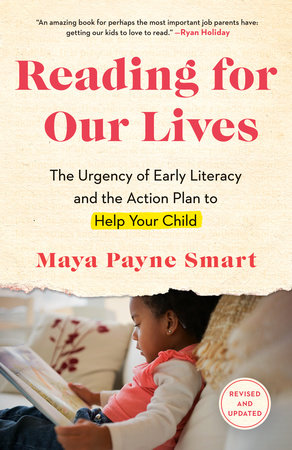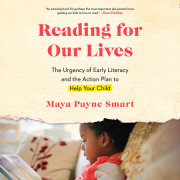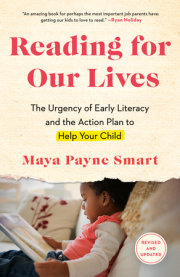1Beyond Bedtime Stories: The Truth About Getting Kids Ready to ReadKeep in mind always the present you are constructing. It should be the future you want.-Alice Walker
A mom friend and I had been having a forgettable chat in a picturesque little café when I brought it up-a subject that made her visibly tense.
I'd known her as an unflappable, high-powered management consultant turned tech executive. She was a visionary, always spoiling for a challenge worthy of her considerable skills and talents. Thoughtful and strategic, she brought a commanding yet optimistic presence to meetings and made people want to rise to the heights of her ambitious proposals. But on that day, I struck a nerve with an offhand remark about how little parents know about teaching their kids to read-that is, how we're just told to read to them every day and wait for the magic to set in.
"I used to get so angry when I would hear that advice," she said. "I was working so hard when my kids were little. I didn't have an hour to read to them every night and I felt so bad about it." She recalled hoping at the time that enrolling the kids in "good schools" would make up for the deficit in reading to them. Still, she had carried guilt about it for years. Her kids were in high school by the time I met her, but the memory pained her. She may have given her kids her all, but in her mind, she'd come up short on that one measure, and she didn't let herself forget it.
I've been a part of countless conversations about raising readers, and these tend to get emotional. I've heard the heartfelt testimony of a woman who records incarcerated mothers reading picture books and then ships the books and recordings to their kids, so they can have some semblance of a bedtime ritual with Mom. I've heard from multilingual parents who fret about passing on their first language without undermining their child's progress in learning English. I've spoken with parents after they've just received the jarring news that their child has been diagnosed with dyslexia. They all grappled with intense worry and frustration that came from discovering their children had a need they didn't know how to meet. You can hear the edge of panic in their tones.
The café conversation stuck with me, though, because the angst this parent was feeling wasn't coming from an overtly vulnerable position. The family wasn't in crisis. Her kids had performed well in school and were on the cusp of launching into college. Theirs was an educational success story, judged by most standards but her own.
Around the same time, I spoke with another mom who said she had made time to read to her three sons at length every night for more than a decade. Yet she was just as tortured by her decision to go all in on bedtime stories as the mom who hadn't. The second mom had clung to the nighttime ritual like a badge of honor, but her middle son still struggled with reading. He lacked the skill and motivation to read well for himself and had recently bombed his state achievement test.
"But I read to him every night," she told me, expressing her sense that she'd been cheated out of an expected return. She was angry that she'd have to pay a tutor to teach what he'd missed, that she hadn't acted earlier on signs that he needed more support, that what worked for one child didn't work for all. "I noticed he read like a robot, but thought it just takes some kids longer."
How could it be that moms at both ends of the spectrum-one who had read every night and one who hadn't-both described nearly identical feelings of inadequacy, uncertainty, and disappointment? The answer, I came to understand, was in the singular focus on bedtime reading. Both clung to the particular raise-a-reader tactic as
the measure of their influence. And both suffered for it. That's because our loud cultural push for daily reading aloud, devoid of proper context, has a way of both shaming those who can't instill the habit and giving a false sense of security to those who can.
Both moms had fixated on a storytime-to-success message that resounds in the press, libraries, schools, and parenting programs. The well-intended advice is everywhere, but its delivery tends to raise more questions than it answers. Like most fairy tales, this particular story is well-worn, fractured with each retelling, and prone to magical leaps. It skips over crucial detail about the long, winding roads to reading. Day-to-day life with little kids exposes the missing plot points: How do you make family reading a habit? And if you do, does the ritual really bring about the host of benefits it's been praised for? What else is required of parents to get the job done?
A news website warns, "Children who were read five books a day starting at birth were exposed to 1.4 million more words than kids who aren't read to . . . and this reading gap may have a profound impact on a child's future literacy and vocabulary." Real-world parents wonder how short those five books may be, and how fast those parents read.
A grocery store's book drive reminds shoppers that "the single most significant factor influencing a child's early educational success is an introduction to books and being read to at home prior to beginning school." The pressure's on, and shoppers with toddlers in tow worry about what exactly qualifies as "an introduction" and how far before kindergarten we're talking.
An author declares, "The rewards of early reading are astonishingly meaningful: toddlers who have lots of stories read to them turn into children who are more likely to enjoy strong relationships, sharper focus, and greater emotional resilience and self-mastery. The evidence has become so overwhelming that social scientists now consider read-aloud time one of the most important indicators of a child's prospects in life." Our antennas go up.
Bedtime stories do all that?We get the message: Reading aloud is a multivitamin for kids and a proxy for good parenting, too. If you do it each night, you can build their brains and inspire a lifetime of literary delight, family bonding, and accomplishment.
Of course, there's more to the story. Reading aloud, though valuable, isn't everything. It's time to move beyond fairy tales and to root your own reading story in reality.
The Top Six Parent Levers for LiteracyWhen it comes to getting kids off to a strong start, parents are in the driver's seat, but it's like one of those dual-control driving-school cars with two steering wheels, accelerators, and brakes-one for the student and one for the instructor. Even babies who haven't spoken a word are actively learning and growing. You're not pouring information into an empty vessel. You're responding to your child's gaze, gestures, vocalizations, and (eventually) words, and stimulating more.
A time will come when you hand over the keys, take a back seat, or exit the car altogether. But initially you're in it together, and you've got a great deal of learning to do yourself about how to encourage, teach, and advocate for your child. You know how to read, but you've still got to learn how to explain how all the buttons and levers work so you can help your child use them, too. You've also got to keep scanning the horizon to see how their current language environment and experiences will impact their future success-insights that are possible thanks to advances in experimental studies, brain imaging, and more. With this vision in place, you'll be better equipped to nurture their literacy, years before they can be expected to distinguish letters or sounds, let alone read words or paragraphs.
As pediatric surgeon and early-language advocate Dana Suskind writes, "Without a concerted look, we might actually believe that the problems we see in older children start at the moment we observe them." In fact, research shows vast cognitive function disparities between infants as young as 9 months old, and sizable vocabulary and wide real-time language processing gaps are evident among toddlers.
There are countless ways a parent can make a difference early on, but the following six are the most powerful to leverage as infants and toddlers grow into preschoolers and kindergartners. I introduce them here and then revisit them in depth in subsequent chapters, so you have several sample practices, talking points, and tips to test-drive for yourself.
Lever #1: ConversationEarly talk is our point of greatest leverage for improving children's futures.-LENA
Want your child's IQ and academic performance to land off the charts? Then launch their learning and language development with lots of conversation when they're young. I can't emphasize this finding enough: kids who engage in more back-and-forth dialogue with adults in their early years tend to have better reasoning, logic, problem-solving abilities, verbal comprehension, and vocabulary skills than kids who've experienced fewer "conversational turns" during the pivotal time frame. Simply put, conversation spurs brain development that's crucial for all kinds of success.
LENA, a national nonprofit focused on enhancing early-language experiences, created technology that's collected tens of thousands of daylong recordings of children, families, and caregivers talking in their natural home and childcare environments. Analysis of that data reveals that the dynamism of the conversation-how much the child participates and responds-matters, not merely the number of words spoken to or by them.
Research by a team at Harvard University, MIT, and the University of Pennsylvania gives some insight into how verbal exchanges work their brain magic to boost language skills, cognitive capacity, and academic achievement down the road. Using functional MRI technology, researchers found that the more conversational exchanges or turns children had experienced with adults, the greater the activity in the brain region associated with speech production, called Broca's area, during a story-listening task. In another study by some of the same researchers, diffusion MRI neuroimaging revealed that the back-and-forth of the adult-child conversation changes the physical structure of the brain by forging stronger links between Broca's area and Wernicke's area, a region associated with language comprehension.
For parents, these peeks into brain function and structure help explain some of the differences we see in kids' language development. They also suggest that engaging in conversation with your child from day one is a powerful way to promote optimal brain development. (Easier said than done in the age of the smartphone, when text messages, social media, and electronic notifications drive parents to chronic distraction.)
Every parent needs to know that language precedes literacy development. Yet 94 percent of moms in one study said that no health professional had ever talked with them about their newborn's language development. Rather, the doctors and nurses who advise us often focus on immediate matters of safety.
When I brought my daughter home from the hospital, I was in survival mode, consumed with worry about car seat safety and breastmilk supply. I needed to get her home and keep her fed. A few days in, more confident about the bare essentials, I started reading to her. But no one told me the specifics of how to talk to her or the urgency of why. I didn't grasp my full power to build her brain and boost her emergent communication skills through words and responsiveness. Now I know that early-childhood language affects life prospects-and so do you.
In Chapter 6, we'll explore early-language research, plus the simplest proven ways to implement its recommendations. We all bring different cultural, familial, and individual preferences to how (and how much) we talk, but most of us could stand to converse much more with our kids. Hang on to this insight and give kids the benefit of your words, warmth, and responsiveness. Even on the busiest, most exhausting, distracting, and turbulent days, remember the urgency of using your voice and your ears to tune into your little one.
Lever #2: Book SharingBooks are meat and medicineand flame and flight and flower,steel, stitch, cloud and clout,and drumbeats on the air.-Gwendolyn Brooks
Reading out loud didn't get a reputation as "the single most important activity for helping children become literate" for nothing. It
is pivotal for boosting brain capacity, stimulating language development, spurring vocabulary growth, increasing knowledge about the world, driving kids' motivation to read on their own, and more. It's just not the be-all and end-all. Parents need to know that there's more to raising a reader than reading aloud and that there's more to reading aloud than reciting words on the page.
Children have so much to learn in the first years of life, and sharing books is a powerful strategy you can use to support them. I say "sharing" books instead of "reading" them because, at first, infants and toddlers will be more interested in biting and exploring the pages of the physical book than attending to its words or letters. Plus, with young children's short attention spans in mind, you may not get to the end before they tire, wander off, or become disengaged. Your time spent sharing books with infants, toddlers, and young children should be more about togetherness, affection, and communication than reading pages word for word.
A family's literacy culture is the product of its reading resources, relationships, and rituals. Books provide stories, eye candy, and language. The parent brings experience, speech, and enthusiasm. The child engages with the book and with their parent's voice and offers attention and language of their own. The three parties-book, parent, and child-connect differently every time. Even rereadings of familiar texts are new, because our demeanor and attention changes from moment to moment, from day to day.
Over time, the books you share will introduce more complex and varied words than typical everyday speech, get your child familiar with print and spelling (as opposed to just spoken language), and build their language comprehension, to name a few benefits.
Studies show that a literature-rich home environment, exemplified by having a large home library or routine engagement with books, bolsters kids' grades and standardized test performance. One analysis found that a robust home library in childhood was associated with better literacy, numeracy, and technological problem-solving skills well into adulthood-beyond the benefits that come from parents' educational levels or career accomplishments. And those long-lasting advantages held across pooled data from more than two dozen societies spanning four continents.
As the researchers put it, "In sum, the benefits of bookishness for attainment are beyond question . . . Early exposure to books in parental home matters because books are an integral part of routines and [the] practices which enhance life-long cognitive competencies."
Many books can promote the sharing, reading, rituals, and relationships between parent and child that matter for kids' development. And Chapter 2's got you covered with specific suggestions to help you capture kids' attention at each age and stage.
Copyright © 2025 by Maya Payne Smart. All rights reserved. No part of this excerpt may be reproduced or reprinted without permission in writing from the publisher.






